Man Martin's Blog, page 207
February 19, 2012
February 19, Presidential Losers: George McClellan
George McClellan, 1864
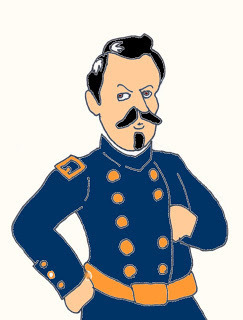 George McClellan1 Disaffected with the Civil War, which wasn't turning out to be as much fun as everyone had hoped, Democrats nominated George McClellan as an anti-war alternative, an odd thing since George was former General in Chief of the Union Army. On the other hand, as generals go, his military record was an ideal one for a peace candidate. Lincoln once asked politely if could borrow the army for a while since George didn't seem to be using it. So angered was Congress with George's tardiness in dealing with Confederates camped within spitting distance of DC, they called him to testify and justify his actions, or lack thereof. George, however, had a doctor's note explaining he was sick and couldn't attend.
George McClellan1 Disaffected with the Civil War, which wasn't turning out to be as much fun as everyone had hoped, Democrats nominated George McClellan as an anti-war alternative, an odd thing since George was former General in Chief of the Union Army. On the other hand, as generals go, his military record was an ideal one for a peace candidate. Lincoln once asked politely if could borrow the army for a while since George didn't seem to be using it. So angered was Congress with George's tardiness in dealing with Confederates camped within spitting distance of DC, they called him to testify and justify his actions, or lack thereof. George, however, had a doctor's note explaining he was sick and couldn't attend.
George had little chance of winning the election because most of the states that would have voted against Lincoln were in the Confederacy anyway and couldn't vote, and Union soldiers, in a touching display of patriotism and voter fraud, intimidated potential Democrats at the polls, voted in states where they were not registered, and, in extreme cases, rose from the dead to cast their ballots for the Great Emancipator. The outcome proved George McClellan every bit as effective a presidential candidate as he had been a general.
Result
Abraham Lincoln: 212George McClellan: 21
1. If I may be permitted to add a footnote to a picture, I have often been struck by the peculiar fashion among military men for posing with one hand stuck in their jackets. I can only account for it by thinking it saved early portraitists the difficulty of painting fingers.

 George McClellan1 Disaffected with the Civil War, which wasn't turning out to be as much fun as everyone had hoped, Democrats nominated George McClellan as an anti-war alternative, an odd thing since George was former General in Chief of the Union Army. On the other hand, as generals go, his military record was an ideal one for a peace candidate. Lincoln once asked politely if could borrow the army for a while since George didn't seem to be using it. So angered was Congress with George's tardiness in dealing with Confederates camped within spitting distance of DC, they called him to testify and justify his actions, or lack thereof. George, however, had a doctor's note explaining he was sick and couldn't attend.
George McClellan1 Disaffected with the Civil War, which wasn't turning out to be as much fun as everyone had hoped, Democrats nominated George McClellan as an anti-war alternative, an odd thing since George was former General in Chief of the Union Army. On the other hand, as generals go, his military record was an ideal one for a peace candidate. Lincoln once asked politely if could borrow the army for a while since George didn't seem to be using it. So angered was Congress with George's tardiness in dealing with Confederates camped within spitting distance of DC, they called him to testify and justify his actions, or lack thereof. George, however, had a doctor's note explaining he was sick and couldn't attend.George had little chance of winning the election because most of the states that would have voted against Lincoln were in the Confederacy anyway and couldn't vote, and Union soldiers, in a touching display of patriotism and voter fraud, intimidated potential Democrats at the polls, voted in states where they were not registered, and, in extreme cases, rose from the dead to cast their ballots for the Great Emancipator. The outcome proved George McClellan every bit as effective a presidential candidate as he had been a general.
Result
Abraham Lincoln: 212George McClellan: 21
1. If I may be permitted to add a footnote to a picture, I have often been struck by the peculiar fashion among military men for posing with one hand stuck in their jackets. I can only account for it by thinking it saved early portraitists the difficulty of painting fingers.
Published on February 19, 2012 07:36
February 18, 2012
February 18: Presidential Losers: John Breckinridge, John Bell, Stephen Douglas
John Breckinridge, John Bell, Stephen Douglas: 1860
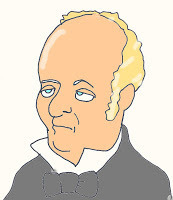 John Bell
John Bell
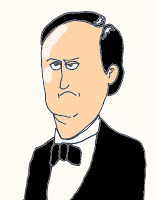 John Breckinridge
John Breckinridge
In the election of 1860 tensions were high. It was pretty evident the southern states were ready to split from the Union, and whoever was elected president would have a bloody, protracted Civil War on his hands. Naturally, everyone wanted a piece of that. There were not two, but four, major presidential candidates, if we count Abraham Lincoln. You might say Lincoln was not a nationally recognized candidate because his name didn't even appear on the southern ballots. 1 Nevertheless, it was evident that Lincoln was the man to beat, and a lively good-natured smear campaign was directed against him, particularly for his folksy ways and "slang-whanging stump speaker style." 2 Political cartoonists with rapier-like wit made the cognoscenti ponder deeply about the consequences of a Republican White House with pictures of thick-licked black men kissing white women while Lincoln looked on, unconcerned. 3
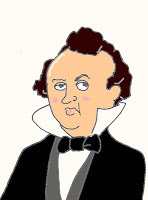 Stephen Douglas
Stephen Douglas
The most memorable of the also-rans was fourth-place finisher, Stephen Douglas – also known as "The Little Giant" 4 – who introduced a new wrinkle into presidential campaigns by actually campaigning. While Lincoln and the others stayed put, Douglas set off to "visit his mother;" the trip from New York City where Douglas lived to upstate New York where Momma lived, somehow took him through New England, Pennsylvania, and Maryland. Then he had to go see his lawyer, which took him through lengthy detours in the south. In spite of all his efforts, the electoral votes in the more-populous free states gave Lincoln a comfortable majority.
The Result
Abraham Lincoln: 180John Breckenridge: 72John Bell: 39Stephen Douglas: 12
1. He probably wouldn't have gotten many votes down there anyways.2. For a sample of what his enemies were referring to, consider these lines from the Gettysburg Address: "It is rather for us to be here dedicated to the great task remaining before us -- that from these honored dead we take increased devotion to that cause for which they gave the last full measure of devotion -- that we here highly resolve that these dead shall not have died in vain -- that this nation, under God, shall have a new birth of freedom -- and that government of the people, by the people, for the people, shall not perish from the earth." (Whang that slang, Abe!)3. Actually the white girls in the pictures didn't seem too bothered by it either.4. By this logic, Lincoln was a Very Tall Dwarf.

 John Bell
John Bell  John Breckinridge
John Breckinridge In the election of 1860 tensions were high. It was pretty evident the southern states were ready to split from the Union, and whoever was elected president would have a bloody, protracted Civil War on his hands. Naturally, everyone wanted a piece of that. There were not two, but four, major presidential candidates, if we count Abraham Lincoln. You might say Lincoln was not a nationally recognized candidate because his name didn't even appear on the southern ballots. 1 Nevertheless, it was evident that Lincoln was the man to beat, and a lively good-natured smear campaign was directed against him, particularly for his folksy ways and "slang-whanging stump speaker style." 2 Political cartoonists with rapier-like wit made the cognoscenti ponder deeply about the consequences of a Republican White House with pictures of thick-licked black men kissing white women while Lincoln looked on, unconcerned. 3
 Stephen Douglas
Stephen DouglasThe most memorable of the also-rans was fourth-place finisher, Stephen Douglas – also known as "The Little Giant" 4 – who introduced a new wrinkle into presidential campaigns by actually campaigning. While Lincoln and the others stayed put, Douglas set off to "visit his mother;" the trip from New York City where Douglas lived to upstate New York where Momma lived, somehow took him through New England, Pennsylvania, and Maryland. Then he had to go see his lawyer, which took him through lengthy detours in the south. In spite of all his efforts, the electoral votes in the more-populous free states gave Lincoln a comfortable majority.
The Result
Abraham Lincoln: 180John Breckenridge: 72John Bell: 39Stephen Douglas: 12
1. He probably wouldn't have gotten many votes down there anyways.2. For a sample of what his enemies were referring to, consider these lines from the Gettysburg Address: "It is rather for us to be here dedicated to the great task remaining before us -- that from these honored dead we take increased devotion to that cause for which they gave the last full measure of devotion -- that we here highly resolve that these dead shall not have died in vain -- that this nation, under God, shall have a new birth of freedom -- and that government of the people, by the people, for the people, shall not perish from the earth." (Whang that slang, Abe!)3. Actually the white girls in the pictures didn't seem too bothered by it either.4. By this logic, Lincoln was a Very Tall Dwarf.
Published on February 18, 2012 03:24
February 17, 2012
February 17 Presidential Losers: John Freemont and Millard Fillmore
John Freemont and Millard Filmore, 1860
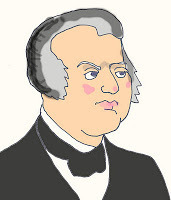 Millard Filmore
Millard Filmore
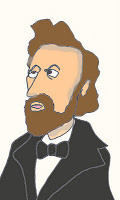 John FreemontIn the 1860 election, slavery was the driving issue. There were three camps: for it, against it, and don't care. The "for it" candidate, Democrat James Buchanan, was destined to win, while the "against-it" candidate, Republican John Freemont would lose. Democrats said having a Republican in the White House would result in a civil war. The next election brought both. The third party, and my personal favorite, was the Know-Nothings, headed by former president Millard Fillmore, which is the coolest and most honest name for any political party ever. Why can't we have more of that? The Dumb-Ass Party, for example, or the Lying-Thieving-Crooks-Who'd-Sell-Their-Own-Mother-for-a-Vote-Party. The Know-Nothings took no stand on slavery whatsoever, instead turning their attention to more pressing matters. Specifically, they didn't want to let in any more Catholics, Irish, Germans, and various other European riff-raff. The Know-Nothings were proud Americans descended from Germans, Irish, and various European riff-raff. They also called themselves "The Native American Party" which sounds like they'd have let in a bunch of Indians, which in itself would've made sense, because the Indians would have had a lot to say about the folly of unchecked immigration. Unfortunately for the Know-Nothings, the Indians were all in the Oklahoma Territory by this time, and couldn't vote anyway. In any case, the Know-Nothings became so popular that soon you could buy Know-Nothing candy, Know-Nothing tea, and Know-Nothing toothpicks, which serious Know-Nothings deplored. "The party used to mean something, man! It wasn't always about making money, it used to be about the bigotry!" The Know-Nothings didn't change the outcome of the election, though, and the Democrats handily took the White House.
John FreemontIn the 1860 election, slavery was the driving issue. There were three camps: for it, against it, and don't care. The "for it" candidate, Democrat James Buchanan, was destined to win, while the "against-it" candidate, Republican John Freemont would lose. Democrats said having a Republican in the White House would result in a civil war. The next election brought both. The third party, and my personal favorite, was the Know-Nothings, headed by former president Millard Fillmore, which is the coolest and most honest name for any political party ever. Why can't we have more of that? The Dumb-Ass Party, for example, or the Lying-Thieving-Crooks-Who'd-Sell-Their-Own-Mother-for-a-Vote-Party. The Know-Nothings took no stand on slavery whatsoever, instead turning their attention to more pressing matters. Specifically, they didn't want to let in any more Catholics, Irish, Germans, and various other European riff-raff. The Know-Nothings were proud Americans descended from Germans, Irish, and various European riff-raff. They also called themselves "The Native American Party" which sounds like they'd have let in a bunch of Indians, which in itself would've made sense, because the Indians would have had a lot to say about the folly of unchecked immigration. Unfortunately for the Know-Nothings, the Indians were all in the Oklahoma Territory by this time, and couldn't vote anyway. In any case, the Know-Nothings became so popular that soon you could buy Know-Nothing candy, Know-Nothing tea, and Know-Nothing toothpicks, which serious Know-Nothings deplored. "The party used to mean something, man! It wasn't always about making money, it used to be about the bigotry!" The Know-Nothings didn't change the outcome of the election, though, and the Democrats handily took the White House.
The Result
James Buchanan: 174 John Freemont: 114
Millard Fillmore: 8
 Millard Filmore
Millard Filmore
 John FreemontIn the 1860 election, slavery was the driving issue. There were three camps: for it, against it, and don't care. The "for it" candidate, Democrat James Buchanan, was destined to win, while the "against-it" candidate, Republican John Freemont would lose. Democrats said having a Republican in the White House would result in a civil war. The next election brought both. The third party, and my personal favorite, was the Know-Nothings, headed by former president Millard Fillmore, which is the coolest and most honest name for any political party ever. Why can't we have more of that? The Dumb-Ass Party, for example, or the Lying-Thieving-Crooks-Who'd-Sell-Their-Own-Mother-for-a-Vote-Party. The Know-Nothings took no stand on slavery whatsoever, instead turning their attention to more pressing matters. Specifically, they didn't want to let in any more Catholics, Irish, Germans, and various other European riff-raff. The Know-Nothings were proud Americans descended from Germans, Irish, and various European riff-raff. They also called themselves "The Native American Party" which sounds like they'd have let in a bunch of Indians, which in itself would've made sense, because the Indians would have had a lot to say about the folly of unchecked immigration. Unfortunately for the Know-Nothings, the Indians were all in the Oklahoma Territory by this time, and couldn't vote anyway. In any case, the Know-Nothings became so popular that soon you could buy Know-Nothing candy, Know-Nothing tea, and Know-Nothing toothpicks, which serious Know-Nothings deplored. "The party used to mean something, man! It wasn't always about making money, it used to be about the bigotry!" The Know-Nothings didn't change the outcome of the election, though, and the Democrats handily took the White House.
John FreemontIn the 1860 election, slavery was the driving issue. There were three camps: for it, against it, and don't care. The "for it" candidate, Democrat James Buchanan, was destined to win, while the "against-it" candidate, Republican John Freemont would lose. Democrats said having a Republican in the White House would result in a civil war. The next election brought both. The third party, and my personal favorite, was the Know-Nothings, headed by former president Millard Fillmore, which is the coolest and most honest name for any political party ever. Why can't we have more of that? The Dumb-Ass Party, for example, or the Lying-Thieving-Crooks-Who'd-Sell-Their-Own-Mother-for-a-Vote-Party. The Know-Nothings took no stand on slavery whatsoever, instead turning their attention to more pressing matters. Specifically, they didn't want to let in any more Catholics, Irish, Germans, and various other European riff-raff. The Know-Nothings were proud Americans descended from Germans, Irish, and various European riff-raff. They also called themselves "The Native American Party" which sounds like they'd have let in a bunch of Indians, which in itself would've made sense, because the Indians would have had a lot to say about the folly of unchecked immigration. Unfortunately for the Know-Nothings, the Indians were all in the Oklahoma Territory by this time, and couldn't vote anyway. In any case, the Know-Nothings became so popular that soon you could buy Know-Nothing candy, Know-Nothing tea, and Know-Nothing toothpicks, which serious Know-Nothings deplored. "The party used to mean something, man! It wasn't always about making money, it used to be about the bigotry!" The Know-Nothings didn't change the outcome of the election, though, and the Democrats handily took the White House.The Result
James Buchanan: 174 John Freemont: 114
Millard Fillmore: 8
Published on February 17, 2012 03:48
February 16, 2012
February 16 Presidential Losers: Winfield Scott
Winfield Scott, 1852
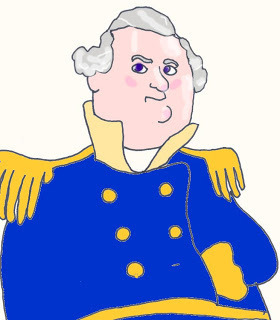 The Whigs and the Democrats had virtually no differences in their political platform, but the Whigs had the snappier dresser in Winfield "Old Fuss and Feathers" Scott, a hero of the Mexican American War, a man of Spartan temperament known for rising at the crack of 6 PM for "a hasty bowl of soup." During a forty-seven year career in the military, Winfield had his high points and low points. A low point was being captured by the British in the War of 1812. Another low point was supervising the Indian Removal from Georgia – that's was they called it, the Indian Removal. It wasn't until later someone thought to call it the Trail of Tears, which is a catchier name. Scott's conscience troubled him about the removal, but he had to follow the orders he'd been given; he'd only been in the army thirty years by that point, and was still seventeen years away from retirement. The high point was capturing Mexico City, but like every sweet moment, this was soured by the slight tang of defeat. The same year as the victorious Mexican Campaign, Scott was defeated in chess by an eight-year-old chess prodigy. Such was Scott's life: some laughter, some tears. Scott did pretty much the same thing for the Whig Party he'd done for the Mexicans: after 1852, the party split, some joining the Democrats, and some forming the Republican party.
The Whigs and the Democrats had virtually no differences in their political platform, but the Whigs had the snappier dresser in Winfield "Old Fuss and Feathers" Scott, a hero of the Mexican American War, a man of Spartan temperament known for rising at the crack of 6 PM for "a hasty bowl of soup." During a forty-seven year career in the military, Winfield had his high points and low points. A low point was being captured by the British in the War of 1812. Another low point was supervising the Indian Removal from Georgia – that's was they called it, the Indian Removal. It wasn't until later someone thought to call it the Trail of Tears, which is a catchier name. Scott's conscience troubled him about the removal, but he had to follow the orders he'd been given; he'd only been in the army thirty years by that point, and was still seventeen years away from retirement. The high point was capturing Mexico City, but like every sweet moment, this was soured by the slight tang of defeat. The same year as the victorious Mexican Campaign, Scott was defeated in chess by an eight-year-old chess prodigy. Such was Scott's life: some laughter, some tears. Scott did pretty much the same thing for the Whig Party he'd done for the Mexicans: after 1852, the party split, some joining the Democrats, and some forming the Republican party.
Result
Franklin Pierce: 254 Winfield Scott: 42
 The Whigs and the Democrats had virtually no differences in their political platform, but the Whigs had the snappier dresser in Winfield "Old Fuss and Feathers" Scott, a hero of the Mexican American War, a man of Spartan temperament known for rising at the crack of 6 PM for "a hasty bowl of soup." During a forty-seven year career in the military, Winfield had his high points and low points. A low point was being captured by the British in the War of 1812. Another low point was supervising the Indian Removal from Georgia – that's was they called it, the Indian Removal. It wasn't until later someone thought to call it the Trail of Tears, which is a catchier name. Scott's conscience troubled him about the removal, but he had to follow the orders he'd been given; he'd only been in the army thirty years by that point, and was still seventeen years away from retirement. The high point was capturing Mexico City, but like every sweet moment, this was soured by the slight tang of defeat. The same year as the victorious Mexican Campaign, Scott was defeated in chess by an eight-year-old chess prodigy. Such was Scott's life: some laughter, some tears. Scott did pretty much the same thing for the Whig Party he'd done for the Mexicans: after 1852, the party split, some joining the Democrats, and some forming the Republican party.
The Whigs and the Democrats had virtually no differences in their political platform, but the Whigs had the snappier dresser in Winfield "Old Fuss and Feathers" Scott, a hero of the Mexican American War, a man of Spartan temperament known for rising at the crack of 6 PM for "a hasty bowl of soup." During a forty-seven year career in the military, Winfield had his high points and low points. A low point was being captured by the British in the War of 1812. Another low point was supervising the Indian Removal from Georgia – that's was they called it, the Indian Removal. It wasn't until later someone thought to call it the Trail of Tears, which is a catchier name. Scott's conscience troubled him about the removal, but he had to follow the orders he'd been given; he'd only been in the army thirty years by that point, and was still seventeen years away from retirement. The high point was capturing Mexico City, but like every sweet moment, this was soured by the slight tang of defeat. The same year as the victorious Mexican Campaign, Scott was defeated in chess by an eight-year-old chess prodigy. Such was Scott's life: some laughter, some tears. Scott did pretty much the same thing for the Whig Party he'd done for the Mexicans: after 1852, the party split, some joining the Democrats, and some forming the Republican party. Result
Franklin Pierce: 254 Winfield Scott: 42
Published on February 16, 2012 02:30
February 15, 2012
February 15 Presidential Losers: Lewis Cass and Martin van Buren
Lewis Cass and Martin van Buren, 1848
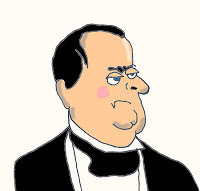 Lewis Cass
Lewis Cass
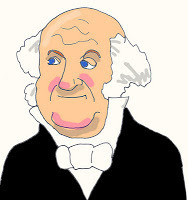 Martin van Buren In 1848, Zachary Taylor was going to be a tough man to beat. In his own lifetime, he was compared to George Washington and Andrew Jackson, but the truth is, in terms of total yardage gained, his stats were better than those two combined. He soundly defeated Santa Anna and his Mexican army, driving them out of Texas once and for all. These days if Mexicans want to visit Palo Alto and Resaca de la Palma, they can get a green card or sneak in across the river the way God intended. Anyway. Remaining opposition divided on the slavery issue. Anti-slavery Democrats didn't trust Cass and split to form the Free Soil Party, nominating former Presidential Loser and Wizard-of-Oz look-alike, Martin van Buren. The division didn't do much to split the vote, however. War-Hero Taylor won handily with 163 electoral votes to Cass' 127, and van Buren received – drum roll – ZERO! That's right, no electoral votes whatsoever, making him the precise opposite of George Washington who was elected by unanimous acclamation, van Buren was rejected by unanimous acclamation.
Martin van Buren In 1848, Zachary Taylor was going to be a tough man to beat. In his own lifetime, he was compared to George Washington and Andrew Jackson, but the truth is, in terms of total yardage gained, his stats were better than those two combined. He soundly defeated Santa Anna and his Mexican army, driving them out of Texas once and for all. These days if Mexicans want to visit Palo Alto and Resaca de la Palma, they can get a green card or sneak in across the river the way God intended. Anyway. Remaining opposition divided on the slavery issue. Anti-slavery Democrats didn't trust Cass and split to form the Free Soil Party, nominating former Presidential Loser and Wizard-of-Oz look-alike, Martin van Buren. The division didn't do much to split the vote, however. War-Hero Taylor won handily with 163 electoral votes to Cass' 127, and van Buren received – drum roll – ZERO! That's right, no electoral votes whatsoever, making him the precise opposite of George Washington who was elected by unanimous acclamation, van Buren was rejected by unanimous acclamation.
Result
Zachary Taylor: 163Lewis Cass: 127Martin van Buren: 0
 Lewis Cass
Lewis Cass  Martin van Buren In 1848, Zachary Taylor was going to be a tough man to beat. In his own lifetime, he was compared to George Washington and Andrew Jackson, but the truth is, in terms of total yardage gained, his stats were better than those two combined. He soundly defeated Santa Anna and his Mexican army, driving them out of Texas once and for all. These days if Mexicans want to visit Palo Alto and Resaca de la Palma, they can get a green card or sneak in across the river the way God intended. Anyway. Remaining opposition divided on the slavery issue. Anti-slavery Democrats didn't trust Cass and split to form the Free Soil Party, nominating former Presidential Loser and Wizard-of-Oz look-alike, Martin van Buren. The division didn't do much to split the vote, however. War-Hero Taylor won handily with 163 electoral votes to Cass' 127, and van Buren received – drum roll – ZERO! That's right, no electoral votes whatsoever, making him the precise opposite of George Washington who was elected by unanimous acclamation, van Buren was rejected by unanimous acclamation.
Martin van Buren In 1848, Zachary Taylor was going to be a tough man to beat. In his own lifetime, he was compared to George Washington and Andrew Jackson, but the truth is, in terms of total yardage gained, his stats were better than those two combined. He soundly defeated Santa Anna and his Mexican army, driving them out of Texas once and for all. These days if Mexicans want to visit Palo Alto and Resaca de la Palma, they can get a green card or sneak in across the river the way God intended. Anyway. Remaining opposition divided on the slavery issue. Anti-slavery Democrats didn't trust Cass and split to form the Free Soil Party, nominating former Presidential Loser and Wizard-of-Oz look-alike, Martin van Buren. The division didn't do much to split the vote, however. War-Hero Taylor won handily with 163 electoral votes to Cass' 127, and van Buren received – drum roll – ZERO! That's right, no electoral votes whatsoever, making him the precise opposite of George Washington who was elected by unanimous acclamation, van Buren was rejected by unanimous acclamation.Result
Zachary Taylor: 163Lewis Cass: 127Martin van Buren: 0
Published on February 15, 2012 02:36
February 14, 2012
February 14 Presidential Losers: Henry Clay
Presidential Loser #18 Henry Clay, 1844
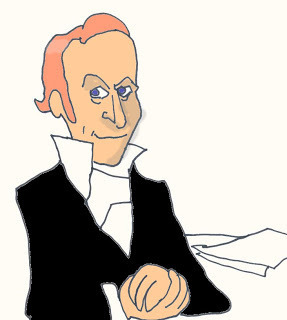 In the 1848 election, the hot button issue was the annexation of Texas. Some anti-slavery folks were concerned this would increase the number and power of the slave states, but Democratic candidate James Polk said, in effect, "No worries. We'll take over Oregon, too, and make that a free state." Even Clay, who was had been formerly against annexing Texas, had to twist his toe in the dirt, and say, alright, maybe we could annex Texas so long as it didn't mean a war or cost too much. Polk's platform of territorial expansion would come to be known as Manifest Destiny. The "Destiny" part meant that United States was destined to keep on taking land until it reached the Pacific Ocean. The "Manifest" part meant, "Just watch us do it." That we were destined to take all the land occupied only by the Indians and Spanish (and some French) is incontrovertible by the fact we did do it, so Manifest Destiny turns out to have been a pretty sound theory after all. It operates on the same principle as if I'm sitting next to a big ol' slice of strawberry cheesecake, and no one's there to stop me, it's Manifest Destiny sooner or later I'm going to eat it. One other candidate (not pictured) was Joseph Smith, governor of Nauvoo, Illinois and founder of the Mormon Church. Smith's campaign was somewhat hampered by the fact he was in jail at the time; that and the fact he was assassinated before the election, effectively prevented his candidacy from getting off the ground. In the end, although the popular vote was a lot closer, the former dark horse James Polk easily crossed the finish line first in electoral votes.
In the 1848 election, the hot button issue was the annexation of Texas. Some anti-slavery folks were concerned this would increase the number and power of the slave states, but Democratic candidate James Polk said, in effect, "No worries. We'll take over Oregon, too, and make that a free state." Even Clay, who was had been formerly against annexing Texas, had to twist his toe in the dirt, and say, alright, maybe we could annex Texas so long as it didn't mean a war or cost too much. Polk's platform of territorial expansion would come to be known as Manifest Destiny. The "Destiny" part meant that United States was destined to keep on taking land until it reached the Pacific Ocean. The "Manifest" part meant, "Just watch us do it." That we were destined to take all the land occupied only by the Indians and Spanish (and some French) is incontrovertible by the fact we did do it, so Manifest Destiny turns out to have been a pretty sound theory after all. It operates on the same principle as if I'm sitting next to a big ol' slice of strawberry cheesecake, and no one's there to stop me, it's Manifest Destiny sooner or later I'm going to eat it. One other candidate (not pictured) was Joseph Smith, governor of Nauvoo, Illinois and founder of the Mormon Church. Smith's campaign was somewhat hampered by the fact he was in jail at the time; that and the fact he was assassinated before the election, effectively prevented his candidacy from getting off the ground. In the end, although the popular vote was a lot closer, the former dark horse James Polk easily crossed the finish line first in electoral votes.
Result
James K Polk: 170Henry Clay: 105

 In the 1848 election, the hot button issue was the annexation of Texas. Some anti-slavery folks were concerned this would increase the number and power of the slave states, but Democratic candidate James Polk said, in effect, "No worries. We'll take over Oregon, too, and make that a free state." Even Clay, who was had been formerly against annexing Texas, had to twist his toe in the dirt, and say, alright, maybe we could annex Texas so long as it didn't mean a war or cost too much. Polk's platform of territorial expansion would come to be known as Manifest Destiny. The "Destiny" part meant that United States was destined to keep on taking land until it reached the Pacific Ocean. The "Manifest" part meant, "Just watch us do it." That we were destined to take all the land occupied only by the Indians and Spanish (and some French) is incontrovertible by the fact we did do it, so Manifest Destiny turns out to have been a pretty sound theory after all. It operates on the same principle as if I'm sitting next to a big ol' slice of strawberry cheesecake, and no one's there to stop me, it's Manifest Destiny sooner or later I'm going to eat it. One other candidate (not pictured) was Joseph Smith, governor of Nauvoo, Illinois and founder of the Mormon Church. Smith's campaign was somewhat hampered by the fact he was in jail at the time; that and the fact he was assassinated before the election, effectively prevented his candidacy from getting off the ground. In the end, although the popular vote was a lot closer, the former dark horse James Polk easily crossed the finish line first in electoral votes.
In the 1848 election, the hot button issue was the annexation of Texas. Some anti-slavery folks were concerned this would increase the number and power of the slave states, but Democratic candidate James Polk said, in effect, "No worries. We'll take over Oregon, too, and make that a free state." Even Clay, who was had been formerly against annexing Texas, had to twist his toe in the dirt, and say, alright, maybe we could annex Texas so long as it didn't mean a war or cost too much. Polk's platform of territorial expansion would come to be known as Manifest Destiny. The "Destiny" part meant that United States was destined to keep on taking land until it reached the Pacific Ocean. The "Manifest" part meant, "Just watch us do it." That we were destined to take all the land occupied only by the Indians and Spanish (and some French) is incontrovertible by the fact we did do it, so Manifest Destiny turns out to have been a pretty sound theory after all. It operates on the same principle as if I'm sitting next to a big ol' slice of strawberry cheesecake, and no one's there to stop me, it's Manifest Destiny sooner or later I'm going to eat it. One other candidate (not pictured) was Joseph Smith, governor of Nauvoo, Illinois and founder of the Mormon Church. Smith's campaign was somewhat hampered by the fact he was in jail at the time; that and the fact he was assassinated before the election, effectively prevented his candidacy from getting off the ground. In the end, although the popular vote was a lot closer, the former dark horse James Polk easily crossed the finish line first in electoral votes. Result
James K Polk: 170Henry Clay: 105
Published on February 14, 2012 02:26
February 13, 2012
February 13 Presidential Losers: Martin van Buren
Presidential Loser #17 Martin van Buren, 1840
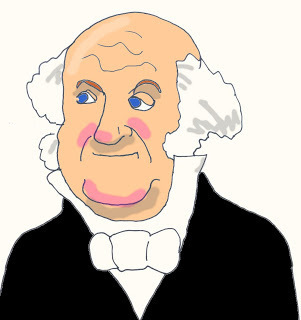 The election of 1840 was a real thrill ride, crazy-zany, cuckoo mess. Okay, actually it was boring as hell. Martin van Buren was electoral toast after the Panic of 1837 when 342 banks failed resulting in a wide-spread financial collapse. (Sound familiar?) It's kind of a shame we don't call these things "panics" any more – it adds a little zest and glamour to economics. Back in the old days they had panics all the time. It was like, "What do you want to do today?" and someone would say, "Let's have a bank panic." They had a panic in 1819, 1857, and 1873. Those worked out so well, they went and had panics in 1884, 1890, and 1893. Then again in 1896, 1901, and 1907. Then in 1911. Then we stopped having panics and instead had the Great Depression. See what I mean? Which do you think sounds more entertaining? A Panic sounds like you'd be running around hollering and waving your arms. Depression sounds like you're lying on the couch watching a chick-flick marathon and eating cookie-dough ice cream. The big sensation of the election was Harrison's campaign song "Tippecanoe and Tyler too," which admittedly has a toe-tapping feel. The lyrics in part ran, "we'll beat little Van, Van, Van, Van is a used up man." The van Buren camp went negative, calling Harrison "granny" and suggesting he was ready to retire to a log cabin and drink cider. Big whoop. It's not like van Buren was Mr Stud-Muffin. Look at the picture, he looks like an understudy to play the Wizard of Oz. Back in the days of Jefferson and Adams there was real character assassination, and not just character assassination either, actual assassination: Aaron Burr shot Alexander Hamilton, for crying out loud. I guess people were just more patriotic in those days.
The election of 1840 was a real thrill ride, crazy-zany, cuckoo mess. Okay, actually it was boring as hell. Martin van Buren was electoral toast after the Panic of 1837 when 342 banks failed resulting in a wide-spread financial collapse. (Sound familiar?) It's kind of a shame we don't call these things "panics" any more – it adds a little zest and glamour to economics. Back in the old days they had panics all the time. It was like, "What do you want to do today?" and someone would say, "Let's have a bank panic." They had a panic in 1819, 1857, and 1873. Those worked out so well, they went and had panics in 1884, 1890, and 1893. Then again in 1896, 1901, and 1907. Then in 1911. Then we stopped having panics and instead had the Great Depression. See what I mean? Which do you think sounds more entertaining? A Panic sounds like you'd be running around hollering and waving your arms. Depression sounds like you're lying on the couch watching a chick-flick marathon and eating cookie-dough ice cream. The big sensation of the election was Harrison's campaign song "Tippecanoe and Tyler too," which admittedly has a toe-tapping feel. The lyrics in part ran, "we'll beat little Van, Van, Van, Van is a used up man." The van Buren camp went negative, calling Harrison "granny" and suggesting he was ready to retire to a log cabin and drink cider. Big whoop. It's not like van Buren was Mr Stud-Muffin. Look at the picture, he looks like an understudy to play the Wizard of Oz. Back in the days of Jefferson and Adams there was real character assassination, and not just character assassination either, actual assassination: Aaron Burr shot Alexander Hamilton, for crying out loud. I guess people were just more patriotic in those days.
Result
William Henry Harrison: 234Martin van Buren: 60

 The election of 1840 was a real thrill ride, crazy-zany, cuckoo mess. Okay, actually it was boring as hell. Martin van Buren was electoral toast after the Panic of 1837 when 342 banks failed resulting in a wide-spread financial collapse. (Sound familiar?) It's kind of a shame we don't call these things "panics" any more – it adds a little zest and glamour to economics. Back in the old days they had panics all the time. It was like, "What do you want to do today?" and someone would say, "Let's have a bank panic." They had a panic in 1819, 1857, and 1873. Those worked out so well, they went and had panics in 1884, 1890, and 1893. Then again in 1896, 1901, and 1907. Then in 1911. Then we stopped having panics and instead had the Great Depression. See what I mean? Which do you think sounds more entertaining? A Panic sounds like you'd be running around hollering and waving your arms. Depression sounds like you're lying on the couch watching a chick-flick marathon and eating cookie-dough ice cream. The big sensation of the election was Harrison's campaign song "Tippecanoe and Tyler too," which admittedly has a toe-tapping feel. The lyrics in part ran, "we'll beat little Van, Van, Van, Van is a used up man." The van Buren camp went negative, calling Harrison "granny" and suggesting he was ready to retire to a log cabin and drink cider. Big whoop. It's not like van Buren was Mr Stud-Muffin. Look at the picture, he looks like an understudy to play the Wizard of Oz. Back in the days of Jefferson and Adams there was real character assassination, and not just character assassination either, actual assassination: Aaron Burr shot Alexander Hamilton, for crying out loud. I guess people were just more patriotic in those days.
The election of 1840 was a real thrill ride, crazy-zany, cuckoo mess. Okay, actually it was boring as hell. Martin van Buren was electoral toast after the Panic of 1837 when 342 banks failed resulting in a wide-spread financial collapse. (Sound familiar?) It's kind of a shame we don't call these things "panics" any more – it adds a little zest and glamour to economics. Back in the old days they had panics all the time. It was like, "What do you want to do today?" and someone would say, "Let's have a bank panic." They had a panic in 1819, 1857, and 1873. Those worked out so well, they went and had panics in 1884, 1890, and 1893. Then again in 1896, 1901, and 1907. Then in 1911. Then we stopped having panics and instead had the Great Depression. See what I mean? Which do you think sounds more entertaining? A Panic sounds like you'd be running around hollering and waving your arms. Depression sounds like you're lying on the couch watching a chick-flick marathon and eating cookie-dough ice cream. The big sensation of the election was Harrison's campaign song "Tippecanoe and Tyler too," which admittedly has a toe-tapping feel. The lyrics in part ran, "we'll beat little Van, Van, Van, Van is a used up man." The van Buren camp went negative, calling Harrison "granny" and suggesting he was ready to retire to a log cabin and drink cider. Big whoop. It's not like van Buren was Mr Stud-Muffin. Look at the picture, he looks like an understudy to play the Wizard of Oz. Back in the days of Jefferson and Adams there was real character assassination, and not just character assassination either, actual assassination: Aaron Burr shot Alexander Hamilton, for crying out loud. I guess people were just more patriotic in those days.Result
William Henry Harrison: 234Martin van Buren: 60
Published on February 13, 2012 02:25
February 12, 2012
February 12 Presidential Losers: William Henry Harrison and Hugh Lawson White
William Henry Harrison and Hugh Lawson White, 1836
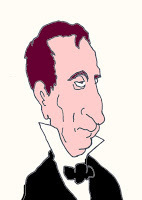 William Henry Harrison
William Henry Harrison
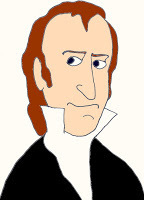 Hugh Lawson White
Hugh Lawson White
In 1836, Andrew Jackson, deciding not to seek a third term, gave his support to Martin van Buren. Republicans, disaffected Democrats, rag-ends of the Federalist Party, and a few hold-outs from the Anti-Masonic Party formed a coalition party, the Whigs. The problem with the Whig coalition is it never really coalesced, and they wound up with not one, but two presidential candidates: William Henry Harrison and Hugh Lawson White. If it had been tag-team wrestling, the Whigs would have whipped some serious booty; unfortunately, it was a presidential race, so they only wound up splitting what support they had. Hugh Lawson White was a former judge and career politician known for his firm and steadfast principles. (BOR-ing!) But Harrison was a man of action and daring-do, a man's man, no matter how sissy he might look in the picture, an old Indian fighter (the new Indians were too tough) who had won himself the nickname of Tippecanoe after a decisive battle of the same name. He'd gone to fight the fierce Indian warrior Tecumseh, and when he couldn't locate him, he fought Tecumseh's medicine man. Whipped him, too. Then he went and burned a deserted Indian village. For this, the American people loved him. Just not as much as Martin van Buren. 1
Result
Martin Van Buren: 170William Henry Harrison: 73Hugh Lawson White: 26
1. Harrison got his chance in the next go-round, when he beat van Buren. Determined to show he was as vigorous and manly as he'd been in his Indian-fighter days, he read his inaugural address in the rain, refusing to wear a hat or hold an umbrella. The speech had been edited by Harrison's pal Daniel Webster, but it hadn't been edited near enough: it was four hours long. Harrison set two records: longest inaugural address and shortest time in office. Sometimes it turns out that whatever doesn't kill you makes you weaker and then you die later from complications. Thus it was for Harrison, who died within a month of taking office.

 William Henry Harrison
William Henry Harrison  Hugh Lawson White
Hugh Lawson White In 1836, Andrew Jackson, deciding not to seek a third term, gave his support to Martin van Buren. Republicans, disaffected Democrats, rag-ends of the Federalist Party, and a few hold-outs from the Anti-Masonic Party formed a coalition party, the Whigs. The problem with the Whig coalition is it never really coalesced, and they wound up with not one, but two presidential candidates: William Henry Harrison and Hugh Lawson White. If it had been tag-team wrestling, the Whigs would have whipped some serious booty; unfortunately, it was a presidential race, so they only wound up splitting what support they had. Hugh Lawson White was a former judge and career politician known for his firm and steadfast principles. (BOR-ing!) But Harrison was a man of action and daring-do, a man's man, no matter how sissy he might look in the picture, an old Indian fighter (the new Indians were too tough) who had won himself the nickname of Tippecanoe after a decisive battle of the same name. He'd gone to fight the fierce Indian warrior Tecumseh, and when he couldn't locate him, he fought Tecumseh's medicine man. Whipped him, too. Then he went and burned a deserted Indian village. For this, the American people loved him. Just not as much as Martin van Buren. 1
Result
Martin Van Buren: 170William Henry Harrison: 73Hugh Lawson White: 26
1. Harrison got his chance in the next go-round, when he beat van Buren. Determined to show he was as vigorous and manly as he'd been in his Indian-fighter days, he read his inaugural address in the rain, refusing to wear a hat or hold an umbrella. The speech had been edited by Harrison's pal Daniel Webster, but it hadn't been edited near enough: it was four hours long. Harrison set two records: longest inaugural address and shortest time in office. Sometimes it turns out that whatever doesn't kill you makes you weaker and then you die later from complications. Thus it was for Harrison, who died within a month of taking office.
Published on February 12, 2012 04:02
February 11, 2012
February 11 Presidential Losers: Henry Clay and William Wirt
Presidential Losers #13 and 14: Henry Clay and William Wirt, 1832
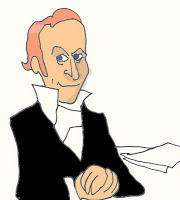 Henry Clay
Henry Clay
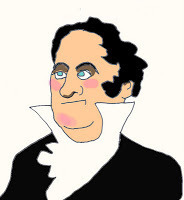 William WirtHenry Clay, who'd been walloped by Andrew Jackson in a four-way race back in '24, came back for another try in spite of the fact Jackson's popularity had only increased during his presidency; the Indian Removal Act proved to be a huge success that exceeded everyone's expectations. If you ever want to be reelected as president, a good way to do it is take a bunch of land from people who can't vote and give it to people who can. The Trail of Tears was not all bad – Jackson was fond of pointing out in speeches that the government was undertaking the removal at its own expense; it wasn't as if the Cherokee had to pay to leave. You have to wonder what Clay was thinking to run against such a visionary and magnanimous chief executive. The third party in the race was the Anti-Masonic Party, which in my personal opinion is really cool. I think it's great to have a party whose sole purpose is to be against a men's philanthropic organization. Why can't we have an Anti-Rotary Club Party, too, and an Anti-Elks Club Party? Anyway, the Anti-Masons were fed up with those damn red fezzes and those secret handshakes and what-not, and weren't going to take it any more. (There had also been a small matter of possible homicide when a Mason threatened to reveal his lodge's secrets, but I think it was mostly a matter of the red fezzes, like I said.) The Anti-Masonic candidate was William Wirt, who himself was a Mason, which indicates a certain amount of confusion on the part of the nominating committee. Apparently, during his acceptance speech, William Wirt praised the good work of the Masons, which perhaps explains why his party didn't do better than it did. If you're going to take a stand, by golly, take it – don't shilly-shally. Where would Andrew Jackson have gotten if sometimes he'd been for Indian rights and sometimes against them? No, he had his principles and he stuck to them.1
William WirtHenry Clay, who'd been walloped by Andrew Jackson in a four-way race back in '24, came back for another try in spite of the fact Jackson's popularity had only increased during his presidency; the Indian Removal Act proved to be a huge success that exceeded everyone's expectations. If you ever want to be reelected as president, a good way to do it is take a bunch of land from people who can't vote and give it to people who can. The Trail of Tears was not all bad – Jackson was fond of pointing out in speeches that the government was undertaking the removal at its own expense; it wasn't as if the Cherokee had to pay to leave. You have to wonder what Clay was thinking to run against such a visionary and magnanimous chief executive. The third party in the race was the Anti-Masonic Party, which in my personal opinion is really cool. I think it's great to have a party whose sole purpose is to be against a men's philanthropic organization. Why can't we have an Anti-Rotary Club Party, too, and an Anti-Elks Club Party? Anyway, the Anti-Masons were fed up with those damn red fezzes and those secret handshakes and what-not, and weren't going to take it any more. (There had also been a small matter of possible homicide when a Mason threatened to reveal his lodge's secrets, but I think it was mostly a matter of the red fezzes, like I said.) The Anti-Masonic candidate was William Wirt, who himself was a Mason, which indicates a certain amount of confusion on the part of the nominating committee. Apparently, during his acceptance speech, William Wirt praised the good work of the Masons, which perhaps explains why his party didn't do better than it did. If you're going to take a stand, by golly, take it – don't shilly-shally. Where would Andrew Jackson have gotten if sometimes he'd been for Indian rights and sometimes against them? No, he had his principles and he stuck to them.1
Result
Andrew Jackson: 219Henry Clay: 49William Wirt: 7
1. William Wirt's tomb was later robbed, and the skull sold to a private collector. The skull was eventually returned, though. It could be identified because the purchaser had written "William Wirt" on it in gold letters.
 Henry Clay
Henry Clay
 William WirtHenry Clay, who'd been walloped by Andrew Jackson in a four-way race back in '24, came back for another try in spite of the fact Jackson's popularity had only increased during his presidency; the Indian Removal Act proved to be a huge success that exceeded everyone's expectations. If you ever want to be reelected as president, a good way to do it is take a bunch of land from people who can't vote and give it to people who can. The Trail of Tears was not all bad – Jackson was fond of pointing out in speeches that the government was undertaking the removal at its own expense; it wasn't as if the Cherokee had to pay to leave. You have to wonder what Clay was thinking to run against such a visionary and magnanimous chief executive. The third party in the race was the Anti-Masonic Party, which in my personal opinion is really cool. I think it's great to have a party whose sole purpose is to be against a men's philanthropic organization. Why can't we have an Anti-Rotary Club Party, too, and an Anti-Elks Club Party? Anyway, the Anti-Masons were fed up with those damn red fezzes and those secret handshakes and what-not, and weren't going to take it any more. (There had also been a small matter of possible homicide when a Mason threatened to reveal his lodge's secrets, but I think it was mostly a matter of the red fezzes, like I said.) The Anti-Masonic candidate was William Wirt, who himself was a Mason, which indicates a certain amount of confusion on the part of the nominating committee. Apparently, during his acceptance speech, William Wirt praised the good work of the Masons, which perhaps explains why his party didn't do better than it did. If you're going to take a stand, by golly, take it – don't shilly-shally. Where would Andrew Jackson have gotten if sometimes he'd been for Indian rights and sometimes against them? No, he had his principles and he stuck to them.1
William WirtHenry Clay, who'd been walloped by Andrew Jackson in a four-way race back in '24, came back for another try in spite of the fact Jackson's popularity had only increased during his presidency; the Indian Removal Act proved to be a huge success that exceeded everyone's expectations. If you ever want to be reelected as president, a good way to do it is take a bunch of land from people who can't vote and give it to people who can. The Trail of Tears was not all bad – Jackson was fond of pointing out in speeches that the government was undertaking the removal at its own expense; it wasn't as if the Cherokee had to pay to leave. You have to wonder what Clay was thinking to run against such a visionary and magnanimous chief executive. The third party in the race was the Anti-Masonic Party, which in my personal opinion is really cool. I think it's great to have a party whose sole purpose is to be against a men's philanthropic organization. Why can't we have an Anti-Rotary Club Party, too, and an Anti-Elks Club Party? Anyway, the Anti-Masons were fed up with those damn red fezzes and those secret handshakes and what-not, and weren't going to take it any more. (There had also been a small matter of possible homicide when a Mason threatened to reveal his lodge's secrets, but I think it was mostly a matter of the red fezzes, like I said.) The Anti-Masonic candidate was William Wirt, who himself was a Mason, which indicates a certain amount of confusion on the part of the nominating committee. Apparently, during his acceptance speech, William Wirt praised the good work of the Masons, which perhaps explains why his party didn't do better than it did. If you're going to take a stand, by golly, take it – don't shilly-shally. Where would Andrew Jackson have gotten if sometimes he'd been for Indian rights and sometimes against them? No, he had his principles and he stuck to them.1Result
Andrew Jackson: 219Henry Clay: 49William Wirt: 7
1. William Wirt's tomb was later robbed, and the skull sold to a private collector. The skull was eventually returned, though. It could be identified because the purchaser had written "William Wirt" on it in gold letters.
Published on February 11, 2012 03:55
February 10, 2012
February 10 Presidential Losers: John Quincy Adams
John Quincy Adams, 1828
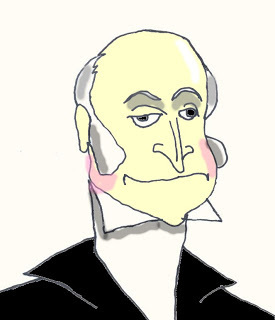 In the rematch against Jackson, the Siamese Twin Party of the Democratic-Republicans finally split into the Democrats (Andrew Jackson) and the Republicans (John Quincy Adams). The odds against John Quincy were long from the start; he'd only gotten into the White House on the last go-round thanks to the support of Henry Clay, speaker of the House and fourth-place finisher in the race of 1824. Andrew Jackson was often underestimated by his opponents who thought his only significant accomplishment was killing some British in the Battle of New Orleans, but in fact, he also later killed a good number of Seminole Indians. Many important issues were raised during the campaign of pressing national interest. For example, it came to light that John Quincy Adams had used public funds to install gambling equipment in the White House, specifically a chess set and pool table, which caused many people to question the judgment of a man they had so admired. Andrew Jackson had troubles of his own. It turned out, his wife Rachel, whom he'd thought was divorced, was not really completely divorced, and so he'd had to remarry her. Also, Jackson had a habit of getting into duels, which made some people wonder if he was really the right timber for the presidency. Aaron Burr, the vice president under John Quincy's dad, had been in a duel as well, but it wasn't the same thing really. Dueling is like playing chess, it's acceptable once in a while, but you don't want to make a habit of it. The Republicans, with the razor-sharp wit that has been their signature ever since, called Jackson a "Jack-ass" (Get it? Jackson/Jack-ass? Ha-ha-ha! That just slays me!) and in the fullness of time, the jackass became the official symbol of the Democratic Party. (Take that, you liberals!) The Democrats, unable to come up with a riposte as devastatingly apt as jackass Jackson, just called John Quincy an ass. In the end though, there was no doubt whose ass got paddled.
In the rematch against Jackson, the Siamese Twin Party of the Democratic-Republicans finally split into the Democrats (Andrew Jackson) and the Republicans (John Quincy Adams). The odds against John Quincy were long from the start; he'd only gotten into the White House on the last go-round thanks to the support of Henry Clay, speaker of the House and fourth-place finisher in the race of 1824. Andrew Jackson was often underestimated by his opponents who thought his only significant accomplishment was killing some British in the Battle of New Orleans, but in fact, he also later killed a good number of Seminole Indians. Many important issues were raised during the campaign of pressing national interest. For example, it came to light that John Quincy Adams had used public funds to install gambling equipment in the White House, specifically a chess set and pool table, which caused many people to question the judgment of a man they had so admired. Andrew Jackson had troubles of his own. It turned out, his wife Rachel, whom he'd thought was divorced, was not really completely divorced, and so he'd had to remarry her. Also, Jackson had a habit of getting into duels, which made some people wonder if he was really the right timber for the presidency. Aaron Burr, the vice president under John Quincy's dad, had been in a duel as well, but it wasn't the same thing really. Dueling is like playing chess, it's acceptable once in a while, but you don't want to make a habit of it. The Republicans, with the razor-sharp wit that has been their signature ever since, called Jackson a "Jack-ass" (Get it? Jackson/Jack-ass? Ha-ha-ha! That just slays me!) and in the fullness of time, the jackass became the official symbol of the Democratic Party. (Take that, you liberals!) The Democrats, unable to come up with a riposte as devastatingly apt as jackass Jackson, just called John Quincy an ass. In the end though, there was no doubt whose ass got paddled.
The Results
Andrew Jackson: 178John Quincy Adams: 83

 In the rematch against Jackson, the Siamese Twin Party of the Democratic-Republicans finally split into the Democrats (Andrew Jackson) and the Republicans (John Quincy Adams). The odds against John Quincy were long from the start; he'd only gotten into the White House on the last go-round thanks to the support of Henry Clay, speaker of the House and fourth-place finisher in the race of 1824. Andrew Jackson was often underestimated by his opponents who thought his only significant accomplishment was killing some British in the Battle of New Orleans, but in fact, he also later killed a good number of Seminole Indians. Many important issues were raised during the campaign of pressing national interest. For example, it came to light that John Quincy Adams had used public funds to install gambling equipment in the White House, specifically a chess set and pool table, which caused many people to question the judgment of a man they had so admired. Andrew Jackson had troubles of his own. It turned out, his wife Rachel, whom he'd thought was divorced, was not really completely divorced, and so he'd had to remarry her. Also, Jackson had a habit of getting into duels, which made some people wonder if he was really the right timber for the presidency. Aaron Burr, the vice president under John Quincy's dad, had been in a duel as well, but it wasn't the same thing really. Dueling is like playing chess, it's acceptable once in a while, but you don't want to make a habit of it. The Republicans, with the razor-sharp wit that has been their signature ever since, called Jackson a "Jack-ass" (Get it? Jackson/Jack-ass? Ha-ha-ha! That just slays me!) and in the fullness of time, the jackass became the official symbol of the Democratic Party. (Take that, you liberals!) The Democrats, unable to come up with a riposte as devastatingly apt as jackass Jackson, just called John Quincy an ass. In the end though, there was no doubt whose ass got paddled.
In the rematch against Jackson, the Siamese Twin Party of the Democratic-Republicans finally split into the Democrats (Andrew Jackson) and the Republicans (John Quincy Adams). The odds against John Quincy were long from the start; he'd only gotten into the White House on the last go-round thanks to the support of Henry Clay, speaker of the House and fourth-place finisher in the race of 1824. Andrew Jackson was often underestimated by his opponents who thought his only significant accomplishment was killing some British in the Battle of New Orleans, but in fact, he also later killed a good number of Seminole Indians. Many important issues were raised during the campaign of pressing national interest. For example, it came to light that John Quincy Adams had used public funds to install gambling equipment in the White House, specifically a chess set and pool table, which caused many people to question the judgment of a man they had so admired. Andrew Jackson had troubles of his own. It turned out, his wife Rachel, whom he'd thought was divorced, was not really completely divorced, and so he'd had to remarry her. Also, Jackson had a habit of getting into duels, which made some people wonder if he was really the right timber for the presidency. Aaron Burr, the vice president under John Quincy's dad, had been in a duel as well, but it wasn't the same thing really. Dueling is like playing chess, it's acceptable once in a while, but you don't want to make a habit of it. The Republicans, with the razor-sharp wit that has been their signature ever since, called Jackson a "Jack-ass" (Get it? Jackson/Jack-ass? Ha-ha-ha! That just slays me!) and in the fullness of time, the jackass became the official symbol of the Democratic Party. (Take that, you liberals!) The Democrats, unable to come up with a riposte as devastatingly apt as jackass Jackson, just called John Quincy an ass. In the end though, there was no doubt whose ass got paddled.The Results
Andrew Jackson: 178John Quincy Adams: 83
Published on February 10, 2012 02:34



